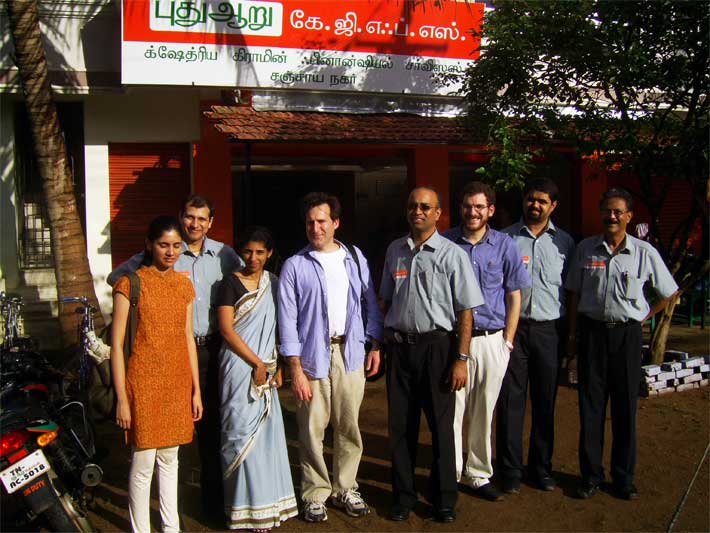Prof. Jonathan Morduch, Professor of Public Policy and Economics at New York University, visited Pudhuaaru KGFS this week. His work has had considerable influence on the way we think about access to finance, shaping some of the key ideas behind the KGFS model.
He first used the ideas of convenience, reliability, continuity and flexibility together in the context of micro finance; ideas that we consider definitional for high quality financial services delivery. Prof. Morduch, who also manages the Financial Access Initiative, has written two very influential books: ‘The Economics of Microfinance’ and ‘Portfolios of the Poor’.
While The Economics of Microfinance was the first comprehensive review of the theory of microfinance, the empirical insights in Portfolios of the Poor brought out the texture of the process by which financial functions are fulfilled by the households, highlighting the importance of consumption smoothing and risk management, widening the narrow enterprise finance focus, which seemed to have become the dominant theme in discussions about micro finance.
Prof. Morduch took time from his hectic India visit to spend one day in Thanjavur, making field visits and brainstorming about the model being developed.
Beginning the day with a brief discussion on the KGFS model, he visited three KGFS branches, starting with Karambayam, the 1st branch of Pudhuaaru KGFS.
The branch visits gave Prof. Morduch the opportunity to interact with clients and KGFS staffs. He discussed many ideas, both conceptual and operational. Though Prof. Morduch was quite generous in his praise of the effort underway at Thanjavur, he gave many critical inputs to improve the model and its implementation. For instance, he suggested that since consumption smoothing is an important function of financial service, the CMS should capture the seasonality of income and expenditure to the extent possible.

In Picture (from left): Shilpa Sathe, Puneet Gupta, Bindu Ananth, Prof. Jonathan Morduch, Anil SG, Jacob Goldston, Suyash Rai, Chandrachudan
We also had a long conversation about the wealth management process, about which he had many ideas, especially on getting the heuristics of the process right. For example, he suggested that we should have a default package of services that could be advised to the client at the time of the enrollment, based on a basic understanding of the client’s profile. Once this is done, the remaining wealth management conversations can happen over a longer period of time. He also suggested some product innovations that could improve the effectiveness of the model. This power packed day has given us much to take away and work on.
—
Suyash Rai from IFMR Trust (presently known as Dvara Holdings) contributed to this post.


4 Responses
Nice blogpost giving insight on the IFMR Trust's initiative and the "narrowness" of the services existing MFIs provide.
Very inspiring. I believe that need based assessments that can leverage the entrepreneurial spirit can alter the course of history.
Excellent take aways. We are converting dream into reality
Must have been a great day. Look forward to seeing more detailed notes and observations